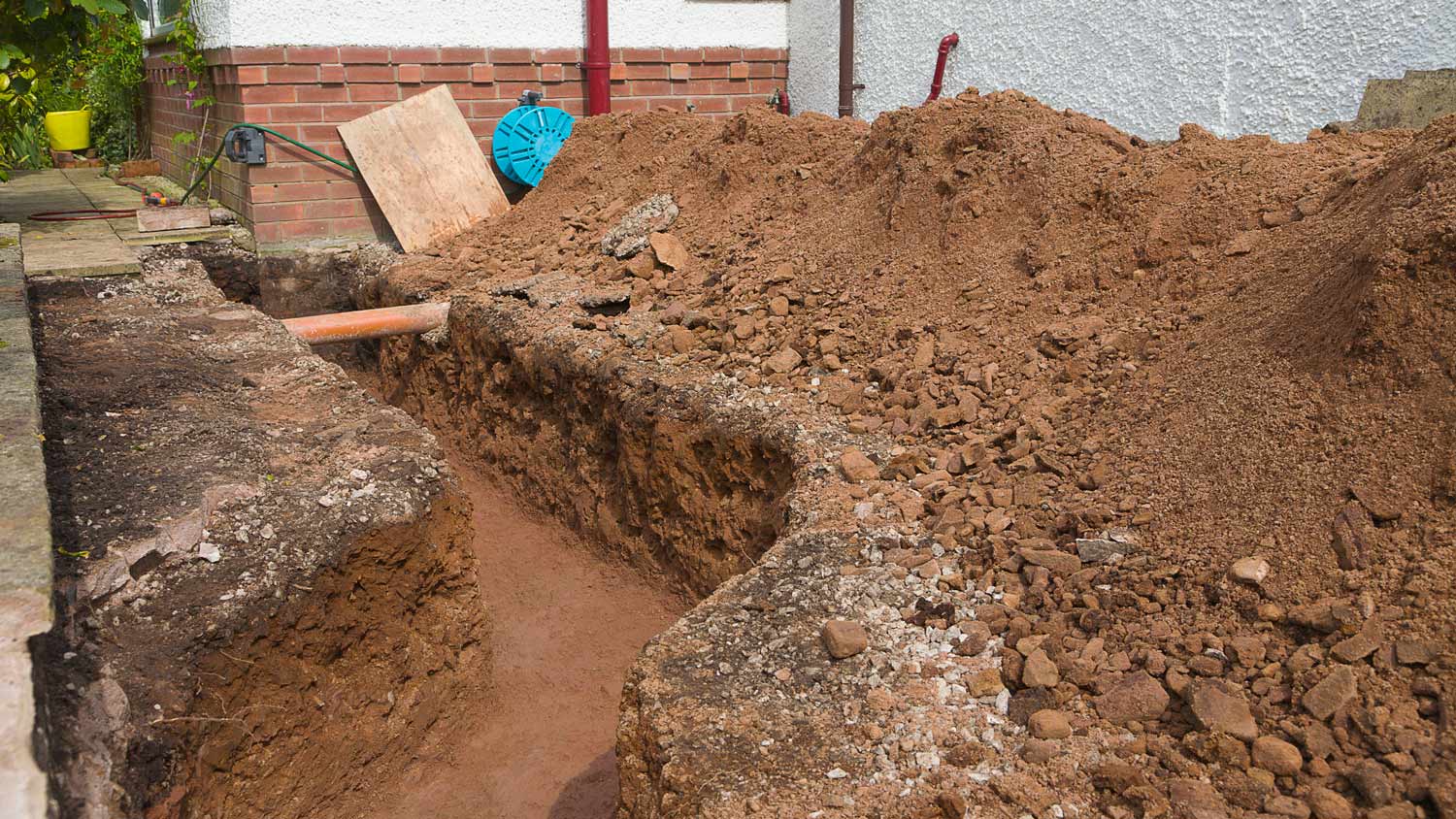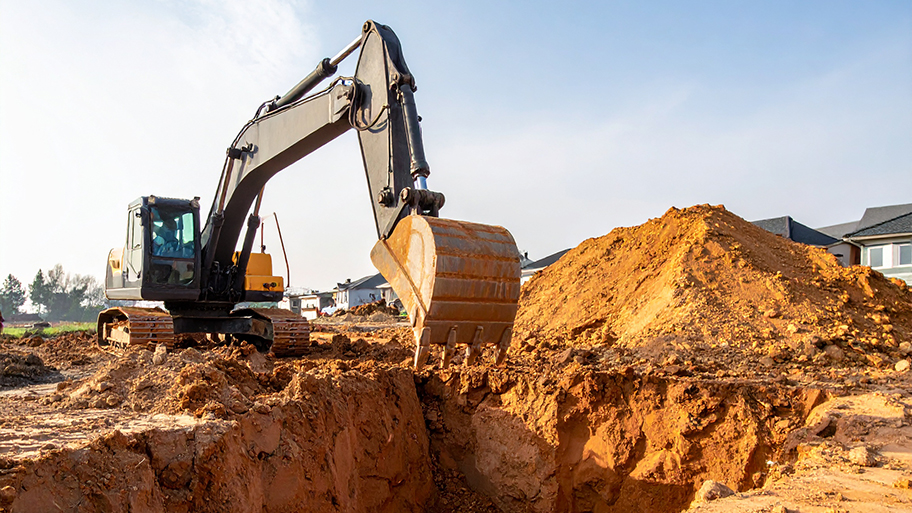
If you’re building a new home, you might need to consider the cost of digging out a basement. Use this pricing guide to get an estimate for the project.
Renting a trencher costs between $120 and $400 per day, for an average daily cost of $280.


On average, renting a trencher costs $280, depending on the type and length of rental.
You can rent a walk-behind trencher for as little as $100, with ride-on options costing as much as $620.
A daily rental costs $280 on average, while a weekly rental costs $980.
Expect to pay $1 to $4 per mile for trencher delivery services.
The average cost to rent a trencher is $280 per day, but it could range from $100 to $620, depending on the type of trencher you need. You should also consider local fuel prices and the cost of transporting the trencher when budgeting for this project.
There are several factors to consider when budgeting for a DIY trenching project, including the type of trencher and how long you’ll need it.
There are two main types of trenchers: walk-behind and ride-on. Walk-behind trenchers are smaller and require manual operation, making them the more affordable option. Ride-on trenchers are bigger, heavier, and pricier to rent. Walk-behind models are best for small and medium trenches, and ride-on trenchers are ideal for larger trenches or difficult terrain.
| Type | Average Daily Rental Cost |
|---|---|
| Walk-behind | $100–$400 |
| Ride-on | $320–$620 |
The total cost to rent a trenching machine also depends on how long you’ll need it. Many companies have a minimum rental period of four hours, but they’ll offer daily, weekly, and monthly rates, as well. You can often get a discount when booking for longer periods.
Here’s an example of how much you might pay for a trencher rental, depending on the length of time you borrow it.
| Rental Period | Average Cost |
|---|---|
| Four hours | $210 |
| Daily | $280 |
| Weekly | $980 |
| Monthly | $2,450 |
You should also consider the cost of fuel for the trencher. Some models run on gasoline, while others use diesel. Trenchers come in a range of tank sizes, but most can hold at least a couple of gallons of fuel.
Gas and diesel costs vary widely based on location, but you can check the latest national and state-specific averages on the AAA website.
Trenchers are heavy-duty machines, with some weighing several hundred pounds. If you don’t have a vehicle that’s large enough to load a trencher, you’ll need to make room in your budget for transportation. This includes either renting a truck or paying for delivery from the rental company—both of which can increase your project cost by hundreds of dollars.
There are three common ways companies charge for heavy machinery rental delivery:
Flat rate
Minimum charge plus a set rate for each mile above the standard delivery range
Set rate per mile
Standard delivery ranges vary from company to company, but common standard ranges are 10 miles to 25 miles. Delivery rates per mile also vary, with common prices ranging from $1 to $4 for each mile driven or each mile driven outside of the standard delivery range.
Your geographical location also influences your cost to rent a trencher. You’ll pay more if you’re in a place with a high cost of living since rental rates and fuel are pricier in these areas. Standard rates may be lower in rural areas, but transportation may be more costly since you or the company will have to drive further out.
The cost of the trencher itself is just one of several expenses to consider when digging a trench. You should also set aside some money to prepare the site and fill the trench back up after the work is complete. Here are some examples of these related costs.
Conducting a land survey costs: $370–$770
Removing trees costs: $200–$2,000
Backfilling the trench with fill dirt costs: $5–$30 per cubic yard
When you rent a trencher and create your own trench, you’ll save a good amount of money on labor. On average, professional labor for trench digging costs around $5.75 per linear foot. So, for a 250-linear-foot trench, that’s more than $1,400 in savings. However, if you need a trencher for more than a few days, the cost of equipment might outweigh these savings.
Price isn’t the only factor to consider when deciding whether to rent a trencher. Hiring a professional will save you time (especially if you don’t know how to use a trencher) and make the process less stressful. By having a pro dig your trench, you won’t have to worry about hitting underground utility lines, cutting through roots or tough soil, or hauling and operating heavy machinery.

Renting a trencher and digging a trench is just the first step in many projects, including water, sewer, and gas line installations. Here’s how much some of this work costs:
Cost to install a drainage system: $2,100–$7,100
Cost to replace a main water line: $650–$2,800
Cost to install a sewer line: $1,400–$5,700
Cost to install a sprinkler system: $1,600–$3,600
Cost to build a retaining wall: $3,200–$9,200
Cost to repair or install a gas line: $260–$820
Looking for ways to reduce the cost of renting a trencher? These money-saving tips can help:
Dig at the right time: Avoid trenching in the winter so that you don’t have to deal with ice, snow, and frozen ground. It’s more time-consuming to dig a trench in these conditions, which can increase your trencher rental costs.
Shop around: To find the best deal, compare pricing from a few trencher rental companies before choosing one. Make sure to weigh their delivery costs with the cost of renting a truck for towing the machinery on your own.
Hire a pro instead: In some cases, renting a trencher simply isn’t worth the expense (or the hassle of getting it to and from your house). You might find that it’s more cost-effective to hire a local excavation company to dig the trench for you.
Home is the most important place on earth, which is why Angi has helped more than 150 million homeowners transform their houses into homes they adore. To help homeowners with their next project, Angi provides readers with the most accurate cost data and upholds strict editorial standards. We extensively research project costs to develop the pricing data you see, so you can make the best decisions for you and your home. We rely on reputable sources, including the U.S. Bureau of Labor Statistics, academic journals, market studies, and interviews with industry experts—all to ensure our prices reflect real-world projects.
Want to help us improve our cost data? Send us a recent project quote to [email protected]. Quotes and personal information will not be shared publicly.
From average costs to expert advice, get all the answers you need to get your job done.

If you’re building a new home, you might need to consider the cost of digging out a basement. Use this pricing guide to get an estimate for the project.

Excavation costs $1,500 to $6,300 for most residential projects—but it depends on factors like the size of the area. This guide will help you plan a budget.

How much does it cost to demolish a house? Average prices for demolition vary based on home size, materials, and location. A partial demolition can make a project more affordable than a full house demolition. Keep reading for more.

Using a trencher is more efficient than using a shovel when excavating. Here’s a basic guide on how to use a trencher for your next project.

Who can dig a trench for you? You can rent trenching equipment for a simple job, but a local excavation company can help with tough ones. Here's how.

Trenches and ditches both involve excavation, but they serve different purposes. Unsure which one you need? Let’s compare a trench versus a ditch.